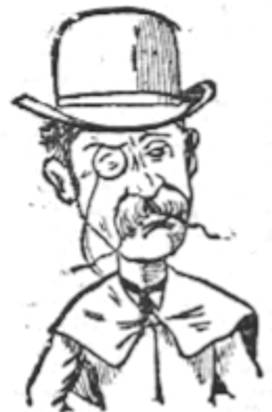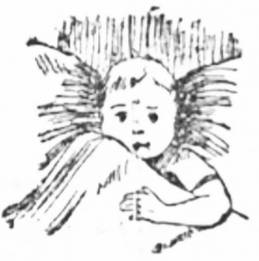This article has been transcribed from a copy of the Cardiff Times in the online collection of scanned Welsh newspapers 1804-1919 in the National Library of Wales, with grateful recognition of the free access accorded to all readers. Paragraph breaks have been introduced for easier reading.
This article gives a husband’s view of the marital difficulties which arise from a limited income. White-collar incomes were not declining in the period, but were experienced as if they were, because expectations were expanding, with more goods and services available and advertised. Samuel populates his column with mentions of neighbours and tradespeople. It is an indication of how loosely ‘Samuel’s’ column is linked to the calendar that he makes no mention of Guy Fawkes’s Day. — David Skilton

Samuel will carry on so.

‘Wha-a-a-t: All this to pay?’
I am not aware, sir, whether millionaires and such-like people are ever subjected to little difficulties with their wives at home anent monetary matters, for I never was a millionaire – and, by[-]the way, I do not see any immediate prospect of becoming one. I always hesitate about describing the manners and customs of persons of whose habits and ways of life I have but a limited knowledge. In this respect, I am singularly unlike the average penny novelist, who generally chooses his lay figures from the ‘hupper suckles,’ and describes with equal facility — and no doubt with equal truth to nature — the doings of diabolical ‘dooks,’ 'aughty hearls, vicious viscounts, and bold, bad baronets. But I can quite conceive it possible that the desires and demands of the wives of men of great wealth keep pace with their husbands' means as a general rule.

Nice old party
In a lower and less wealthy sphere, sir, there are but few of us who are not reminded with some degree of frequency by our respective wives of our pecuniary shortcomings and our apparent niggardliness. I am sorry to say, sir, that your Samuel is most freq[u]ently the chosen subject for such attacks. We will say that on any given day I am in receipt of one of those cheques from you which I cherish so lovingly and with which I part (literally ‘part’) so readily. Mrs Samuel knows full well that such sum of money is due – and she makes her arrangement accordingly. With a sudden and totally unexpected access of affection she volunteers to meet me somewhere in the vicinity of your office, so that I may not have to hurry home with the cheque — so that I may not have it on my mind and in my pocket. Possibly I decline the offer, and murmur something about ‘other business.’

Mr. Baggs.
In this case I hear a corresponding growl touching some mysterious ‘underhand work’ that the lady knows, according to her own account, is about to be perpetrated. And then the lady proceeds somewhat as follows: ‘You'll have to bring me some money home to-day, I can tell you. But I know why you're so reluctant’ (reluctant, heaven save us) ‘to go for it — you've borrowed and spent one-half of it as usual, I expect. But Grubb, the vegetable man, says that he won't wait any longer, and that you're always shuffling him. And Simpson the milkman, poor man, says that he won't give you ‘chalk’ [credit] any longer.’ At this stage, with a mild chuckle, I venture to interpose by saying that I trust Simpson will not give us any more ‘chalk,’ as we had more of that than of anything else from him. This is the immediate and very acrimonious reply, ‘Yes, you can joke now, but you can't face them as I have to do, and with that prying old cat, Mrs Sniffter, opposite, poking her nose through the window-blinds. Everybody says that it is shameful of you; you aren't a bit like other men.’ I venture at this stage to inquire who may be comprised in the very comprehensive term ‘everybody.’ ‘Oh, you know,’ is the reply; ‘your own mother, Mrs Prywell, Mrs Key-hole, Mrs Eaves-dropper, Mrs -- ah, you know very well, and you needn't laugh; you won't laugh when you see the bills’ (I am very certain that I shan't, good sir.) ‘Have you nothing left out of the last lot?’ This I ask in a deprecatory tone. ‘Anything left[?”] (this with what is intended as a withering sneer) ‘I wonder what you expect? Hadn't I to pay for coals, and for a new basinette, and for the crockery that the baby broke? Didn't I have to send school-money? and hadn't I to pay for meat, Bartholomew's suit, pottery, four new pans, those baking tins, the boots you had repaired (I'm sure they didn't want it), two sacks of flour, fruit for preserving, ever so many? but I'll show you the items and things. I won't be called an extravagant woman for nothing! What, say you didn't call me an extravagant woman? Oh, yes, you did, but you always try to shuffle out of it. Other men don't treat their wives so. But I’II show you the items and things.’ At this moment Mrs S., in a state of tremulous indignation, whips from somewhere out of her garments eighty much-thumbed fragments of paper, each one bearing upon its surface a few almost cabalistic characters. ‘You shall see for yourself,’ she says. ‘I’m sure there’s no woman anywhere more careful than I am, and then to be called a wasteful woman. Oh, yes, you did call me one; why you admitted it yourself only five minutes ago. Here, take these items and things and go through then, yourself.’ The ‘items and things’ are here strewn upon the table as though they were a shower of particularly dingy snow, and this is the signal for my departure. As I leave the house hastily, I am informed that certain necessaries are immediately required, these including new boots for the children, the wherewithal to pay two taxes, and about half a hundred things besides.

One of the poor children
I have received the cheque, we will say, and I have promptly cashed it. Having Mrs S. to return to, I think that I will fortify myself for the trying ordeal, therefore I procure a refresher. I find the good lady perusing what is apparently a list of some kind on an attenuated slip of paper that looks almost like a seaside hotel bill, so lengthy is it. ‘Weil,’ say I with an uneasy smile, ‘I'll give you this now,’ and at the same time I hand her a sum of money. I say ‘I'll give you this now,’ as much as to hint to her that the amount banded over is only a small and insignificant sum to that which is ultimately to come. Mrs Samuel takes it incredulously, and then suddenly gives me the jumps by ejaculating ‘Wh-a-a-a-a-t, is this all you've brought? But I shan't have it; you can keep it yourself, and let it go where the other has gone,’ and the money is indignantly bashed upon the table. With an air of great indignity I pick up the lot, affect with much empressement to pocket it, and then say in haughty accents that would go down splendidly at a third-rate theatre, ‘So be it, madam; you shall not have it, you would evidently drive me to drink and desperation — you shall’ — perhaps I ought to add ‘especially the drink,’ but that would lend a serio-comic element to the scene, so I omit the addition. Then I affect to relent, place the money on the table again (minus about five shillings, which I keep as bonus), and say in a choking sort of way peculiar to broken-hearted fathers in gory melodramas, ‘No, I will not take it; I will leave it for the children's sake.’ I am rudely broken in upon by a torrents of words. ‘Don't think you can do your play-acting with me, you ought to be ashamed of yourself: this all you've got -- oh, no! I know where you spend it, but I will go down and inquire how much you got; never tell me that they would dare to offer you this, but you've spent it long since. I know what Mrs MacMischief told me, but I'll find you out, here you can go swelling it about when all the children have scarcely a shoe to their foot, and look at your poor wife; It is a wonder people don't cry shame on you; and you're a fine gentleman, aren't you? You can go and spend money with your precious friends —a fine lot they are. People don't know what you are; but they shall know, they shall, now, they shall — I'll take care of that -- yes, they shall, and pretty soon, too! And look at that; that's from Mixup, the grocer, he knows what you are, he won't wait any longer; he knows about your carrying-on, but you can't expect people to wait for ever; my people always paid their way; but I shall ask what you've had. I'll ask the cashier; he's a nice, respectable man, and he'll tell me; he knows you.’ I mildly acquiesce in this latter opinion, and say that the cashier does know me – well. Things gradually calm down, sir, and about dinner time I find the good lady with the most benignant of smiles busily helping the juvenile crowd, each one of which of course requires the largest helping and the best seat, as per the usual order in considerable families.

One of Samuel’s domestic difficulties personified.
Perhaps, sir, you do not, know what I am pleased to call the pecuniary reproach by implication. It is worked thusly:—The wife of your bosom, we will say, has been refused a sum of money to which she considers herself entitled. You can see by her manner that the absence of the said sum has caused a feeling of irritation. One of the children says ‘Ma, will you buy me a new doll?’ ‘New doll,’ says the lady; ‘new doll, indeed, I can't buy you a new anything; you may be thankful that you get you dinner regularly.’ Nothing but the female mind, sir, can comprehend in what an infinity of ways this species of reproach can be varied, to your own extreme chagrin and annoyance. Such remarks as the following will be heard the day long:—'Put that bonnet down, Betty, it'll be many a long day before your father buys another; he's too fond of himself for that.’ ‘No, you can't have a penny for sweets; it's precious few pennies that your poor mother gets.’ ‘Why didn't I buy a jacket like Mrs Baggs? oh, don't ask me; ask your father; but Mr Baggs knows what is due to his family.’ I may here remark that Mr Baggs, as is subsequently discovered through the medium of the Gazette [which lists insolvent debtors], also knows what is due to his creditors. Sometimes when I know that the sum in hand is less than will be considered necessary to meet the dues and demands, I further decrease the sum total by making on my road home what I consider judicious purchases of an appetising character, meaning therewith to clear the matrimonial horizon on my return. I am sorry to say that this method of producing a mol[l]ifying effect — one eminently successful in the case of some individuals in similar circumstances to myself — grievously fails in my case. My purchases are either regarded with a contemptuous sort of smothered merriment or they are openly derided and denounced. Under these circumstances, sir, I have arrived at the conclusion that although money may not purchase happiness, it decidedly goes a good way in that direction. If a man is to be unhappy it is just as well that he should have lots of coin to do it on; that's how I look at the matter. I should not have been so personal in this article had I not known that I am by no means the only being in the world who is subjected to little personal difficulties of the kind I have indicated. But I mean to make money, sir. I mean to devote my leisure to inventing a drink that will keep people sober, and that yet is not gaseous: or a patent lotion that will make hair grow even on billiard balls; or a remedy for squinting; or a soap that you can scour the neighbourhood with, or a, or a something or other — I'll consider what afterwards. Let the moral of this article be, sir – hurry up with your cheques.
Bibliography
“Samuel’s Sentiments.” Cardiff Times. (5th November 1887).
Last modified 20 January 2022